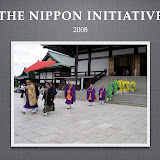On one of the trains we rode to meet with the Enterlines, my assigned seat was next to a young, 26 year-old, Japanese man named Fisyu (probably misspelled). I struck up a conversation with him, eventually asking if he had ever heard of Jesus Christ. Fisyu replied with a smile, "Yes, Jesus Christ superstar!" I remember seeing the play when I was a junior in high school. It is not an accurate representation.
Fisyu spoke a little English, so I continued by explaining who Jesus is as best I could. I gestered with my left hand held up in front of me that "here is the Emperor" and then with my right hand at the same level, "and here is George Bush." Then I held my right hand up higher over my left and said, "And here is Jesus Christ. He is Lord of all."
Fisyu responded by holding up his left hand in similar fashion as me, saying, "Bhudda", and then his right hand at the very same level, saying, "Jesus Christ". In other words, Fisyu was indicating that he believed Bhudda and Jesus were equals.
I wish I had been able to communicate more clearly who Jesus is. He and Bhudda definitely are not on the same level. I told Fisyu that Jesus created him, that he gave him life, that he has life within himself. I explained that Bhudda is dead, but Jesus is alive, having risen from the dead. Fisyu just smiled.
My conversation with Fisyu illustrates the great need in this country where there are countless millions with so little knowledge of who Jesus is and the claims he has on their hearts. It also illustrates the importance of sharing the Gospel here in the same fashion in which it was shared in the Book of Acts. To wax theological for the moment, the Gospel message includes much more than just the assertion that Jesus died. In our country, we often focus exclusively on the death of Jesus as we present the Gospel. There are several problems with this. Among them is the tendency to focus the attention of the person we're talking with only on who Jesus was in the past, rather than on who he is here and now.
In the Book of Acts, and in the rest of the NT as well, the focus is on who Jesus is here and now. He is the exalted Lord of all, seated at the right hand of the Father, both waiting for his enemies to become his footstool and actively involved in bringing about their ultimate defeat. This means that when we tell people about Jesus, we should not only tell them about his death, but also about his resurrection, his ascension, and exaltation. They need to understand that the Jesus on whom they are believing is someone they are encountering in the present. They are not, in other words, being asked simply to believe or give assent to some historical figure of long ago; but rather, to the one who is Lord of All here and now.
By the way, this is not what is commonly called "lordship salvation." Lordship salvation is the idea that someone must "make Jesus their Lord" before they can truly be saved. Usually that means giving Jesus the control over your moral decisions. It is just a faulty understanding of all that is invloved in the realities of Jesus' exaltation. And it comes close to a works-oriented salvation.
What I'm talking about is more in line with the proposition offered in Romans 10:9: "If you confess with your mouth Jesus is Lord, and believe in your heart that God has raised him from the dead, you will be saved." Here the idea is to embrace Jesus by faith, not on the basis only of his death, but on the basis of who he is now ( a crucified, but resurrected, ascended, and exalted Lord of all and the one before whom every person will stand some day for judgment).
This is the way the Gospel is presented in Acts 2 and 17. The interesting thing to me is how suited this way of presenting the Gospel is to Japan. People here understand the concept of "Lord of all". They are very familiar with what an emperor is, so the proposition of there being someone who claims to be the Emperor of Emperors here and now (and forever) clarifies the decision that lies before them. With this said, it still requires divine power for their hearts to be opened to the Lord. It requires the same kind of power that was required to raise Jesus from the dead and that is associated so clearly with his current position at the Father's right hand. Fortunately, this kind of power is still available. Jesus himself promised in Acts 1:8 that he would share his power with us in order to make us effective witnesses unto him, unto who he is here and now.
This is a long post. I will close for now, with more coming later today on our meeting with the Enterlines.
Friday, October 06, 2006
Subscribe to:
Post Comments (Atom)

No comments:
Post a Comment